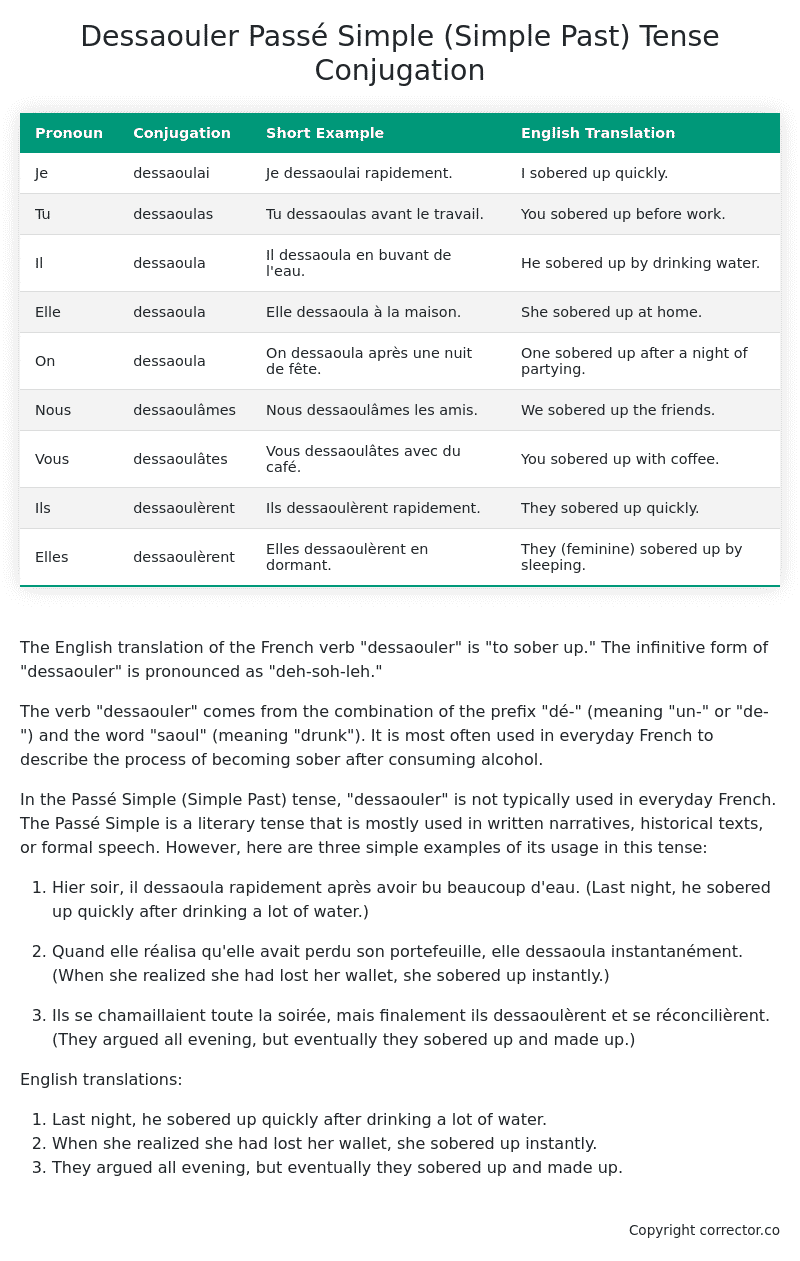Passé Simple (Simple Past) Tense Conjugation of the French Verb dessaouler
Introduction to the verb dessaouler
The English translation of the French verb “dessaouler” is “to sober up.” The infinitive form of “dessaouler” is pronounced as “deh-soh-leh.”
The verb “dessaouler” comes from the combination of the prefix “dé-” (meaning “un-” or “de-“) and the word “saoul” (meaning “drunk”). It is most often used in everyday French to describe the process of becoming sober after consuming alcohol.
In the Passé Simple (Simple Past) tense, “dessaouler” is not typically used in everyday French. The Passé Simple is a literary tense that is mostly used in written narratives, historical texts, or formal speech. However, here are three simple examples of its usage in this tense:
-
Hier soir, il dessaoula rapidement après avoir bu beaucoup d’eau.
(Last night, he sobered up quickly after drinking a lot of water.) -
Quand elle réalisa qu’elle avait perdu son portefeuille, elle dessaoula instantanément.
(When she realized she had lost her wallet, she sobered up instantly.) -
Ils se chamaillaient toute la soirée, mais finalement ils dessaoulèrent et se réconcilièrent.
(They argued all evening, but eventually they sobered up and made up.)
English translations:
- Last night, he sobered up quickly after drinking a lot of water.
- When she realized she had lost her wallet, she sobered up instantly.
- They argued all evening, but eventually they sobered up and made up.
Table of the Passé Simple (Simple Past) Tense Conjugation of dessaouler
| Pronoun | Conjugation | Short Example | English Translation |
|---|---|---|---|
| Je | dessaoulai | Je dessaoulai rapidement. | I sobered up quickly. |
| Tu | dessaoulas | Tu dessaoulas avant le travail. | You sobered up before work. |
| Il | dessaoula | Il dessaoula en buvant de l’eau. | He sobered up by drinking water. |
| Elle | dessaoula | Elle dessaoula à la maison. | She sobered up at home. |
| On | dessaoula | On dessaoula après une nuit de fête. | One sobered up after a night of partying. |
| Nous | dessaoulâmes | Nous dessaoulâmes les amis. | We sobered up the friends. |
| Vous | dessaoulâtes | Vous dessaoulâtes avec du café. | You sobered up with coffee. |
| Ils | dessaoulèrent | Ils dessaoulèrent rapidement. | They sobered up quickly. |
| Elles | dessaoulèrent | Elles dessaoulèrent en dormant. | They (feminine) sobered up by sleeping. |
Other Conjugations for Dessaouler.
Le Present (Present Tense) Conjugation of the French Verb dessaouler
Imparfait (Imperfect) Tense Conjugation of the French Verb dessaouler
Passé Simple (Simple Past) Tense Conjugation of the French Verb dessaouler (You’re reading it right now!)
Passé Composé (Present Perfect) Tense Conjugation of the French Verb dessaouler
Futur Simple (Simple Future) Tense Conjugation of the French Verb dessaouler
Futur Proche (Near Future) Tense Conjugation of the French Verb dessaouler
Plus-que-parfait (Pluperfect) Tense Conjugation of the French Verb dessaouler
Passé Antérieur (Past Anterior) Tense Conjugation of the French Verb dessaouler
Futur Antérieur (Future Anterior) Tense Conjugation of the French Verb dessaouler
Subjonctif Présent (Subjunctive Present) Tense Conjugation of the French Verb dessaouler
Subjonctif Passé (Subjunctive Past) Tense Conjugation of the French Verb dessaouler
Subjonctif Imparfait (Subjunctive Imperfect) Tense Conjugation of the French Verb dessaouler
Subjonctif Plus-que-parfait (Subjunctive Pluperfect) Tense Conjugation of the French Verb dessaouler
Conditionnel Présent (Conditional Present) Tense Conjugation of the French Verb dessaouler
Conditionnel Passé (Conditional Past) Tense Conjugation of the French Verb dessaouler
Conditionnel Passé II (Conditional Past II) Tense Conjugation of the French Verb dessaouler
L’impératif Présent (Imperative Present) Tense Conjugation of the French Verb dessaouler
L’impératif Passé (Imperative Past) Tense Conjugation of the French Verb dessaouler
L’infinitif Présent (Infinitive Present) Tense Conjugation of the French Verb dessaouler
L’infinitif Passé (Infinitive Past) Tense Conjugation of the French Verb dessaouler
Le Participe Présent (Present Participle) Tense Conjugation of the French Verb dessaouler
Le Participe Passé (Past Participle) Tense Conjugation of the French Verb dessaouler
Struggling with French verbs or the language in general? Why not use our free French Grammar Checker – no registration required!
Get a FREE Download Study Sheet of this Conjugation 🔥
Simply right click the image below, click “save image” and get your free reference for the dessaouler Passé Simple tense conjugation!

Dessaouler – About the French Passé Simple (Simple Past) Tense
Formation
Usage
Narration
Historical Context
Interactions with other tenses
Passé Composé
Imparfait
Conditional and Subjunctive
Summary
I hope you enjoyed this article on the verb dessaouler. Still in a learning mood? Check out another TOTALLY random French verb conjugation!


